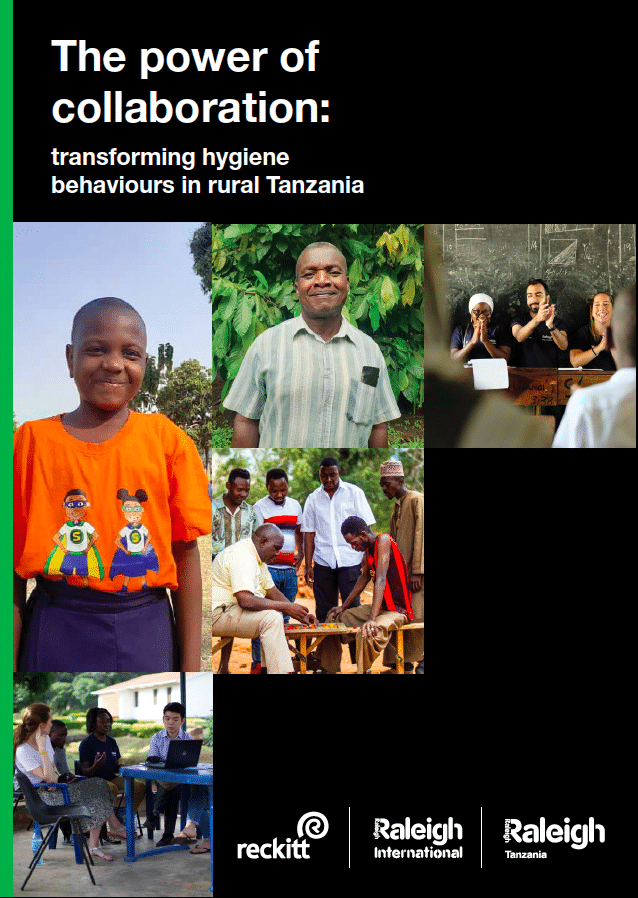Clean water and sanitation for all is a critical Sustainable Development Goal which has only become more significant in the global pandemic. In rural Tanzania the spread of water-borne diseases affects everyday lives, so when Raleigh International young people teamed up with Reckitt employees, they found an impactful way to combat this problem through designing a project known locally as the Healthier Lives Happier Homes project. A new report from Reckitt and Raleigh International highlights the impacts of the project and how collaboration between businesses and youth can create real change.
In rural areas of Kilombero, Tanzania, poor knowledge around good hygiene practices are all too commonplace. In areas where communities are unable to follow good practices around hand washing and food hygiene, there is a higher risk of cholera outbreaks and diarrhoea transmission, putting a strain on families and posing a real and tangible threat to livelihoods.
For six years Raleigh International volunteers have worked to improve health and hygiene practices by working with school children on water and sanitation. However research showed that hygiene behaviours learnt in schools were not cascading into the home, preventing wide spread community change. Raleigh International teamed up with health, hygiene and nutrition company Reckitt to tackle this issue..
Bringing together young people and businesses to create change.
30 Tanzanian young people from Raleigh International partnered with 30 employees from Reckitt to conduct research and brainstorming to develop ideas for tackling water-borne illnesses.
Through their collaboration, the two groups combined their individual perspectives and skillsets. The young people from Raleigh Tanzania brought their WASH knowledge and cultural understanding of their home country, as well as their youth perspective, while the Reckitt employees were able to leverage their specific knowledge and expertise from within the health and hygiene sector. By teaming up, the initiative synergised a range of relevant skills and experience to develop an innovative new programme to combat the problem at hand.
[iframe width=”720″ height=”413″ src=”https://www.youtube.com/embed/o2e2ZzTOGlY” title=”YouTube video player” frameborder=”0″ allow=”accelerometer; autoplay; clipboard-write; encrypted-media; gyroscope; picture-in-picture” allowfullscreen></iframe]
The creation of a new innovative project
Together Tanzanian young people and Reckitt employees created the project known locally as Healthier Lives Happier Homes, a two year project which would improve health and hygiene in rural communities through three hygiene initiatives to embed sanitation behaviours in the home.
From ten ideas generated during the challenge, three initiatives were selected. They focused on training and equipping three influential groups which would be best placed to cascade hygiene practices in their communities. The three initiatives focused on:
- School children: A SWASH Heroes programme was developed to equip school children to become water and sanitation champions dedicated to improving hygiene not only within their schools but in their family homes.
- Fathers: As heads of households, the project targeted babbas (fathers) to be upskilled in health and hygiene. By supporting fathers to be champions for hygiene they were supported to use to their highly influential position to introduce and reinforce hygiene behaviours in their homes and wider community.
- Vendors: Access to sanitation products is critical to improving behaviours in communities, so local entrepreneurs were trained to stock health and hygiene products, to use their position as business people to meet the needs of their communities and encourage better sanitation among their customers.
Designed in partnership between Reckitt employees and Tanzanian youth, the three initiatives were then implemented by young Raleigh Tanzania volunteers over 12 months.
A new report showcased the impact of the project

Following completion of the project in December 2021, over 15,000 people in the target communities were now practicing improved sanitation and hygiene. From June to August 2021, an independent evaluation of the project took place to ascertain the effectiveness of the three initiatives and the extent of change across 20 communities. Launching in December 2021, the report found that:
- The interventions delivered by the project contributed to a reduction of preventable diseases and contributed to a decrease in cases of diarrhoea in the target communities
- There has been a significant shift in perceived responsibilities related to WASH, with many community members responding that they no longer believe just women have to manage WASH, but rather it should be the responsibility of both men and women, with just under 18,000 people reporting that they now had a positive attitude to improved hygiene behaviours..
- The ongoing presence of youth volunteers leading on delivery had a positive impact on the project outcomes by gaining the trust of the communities and encouraged improved sanitation by acting as WASH role models.
Most of all, the report found that the collaboration between young people and business employees was crucial in the success of the project.
- The collaborative efforts of the Reckitt staff and young Tanzanian volunteers were instrumental in the generation of successful project interventions. The combination of corporate experience from Reckitt employees and cultural knowledge of the young Tanzanian volunteers was key to the generation of the successful interventions delivered.
A synergy between youth and business has the power to create impact
At Raleigh International we have long known and trusted in the power that young people have to find solutions to some of the world’s most pressing issues. But through the Healthier Lives Happier Homes project, we have seen that by combining the perspectives and determination of young people with the strengths and expertise from the business world, we can create a new model for development which can change lives for the better.










